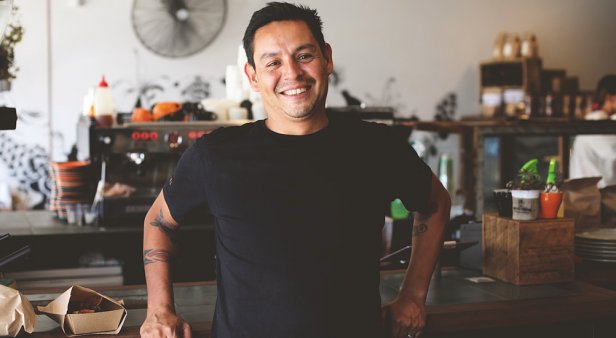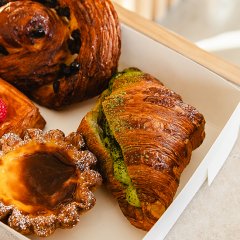Let’s throw it back a little – tell us, how did the idea of The Bread Social first come about?
The Bread Social first began with Paul, Tom and myself meeting over a beer after finishing work in Sydney at Bourke Street Bakery and Central Baking Depot where we’d worked for a number of years. We all felt we wanted to move up to this part of the coast (I grew up in Byron Bay) and start a bakery that was a reflection of our personalities and the things we like to make and eat.
How would you best describe The Bread Social’s philosophy on food and produce?
Our main goal is to make tasty food we like to eat. Our focus is organic, Australian and local produce. We are lucky enough to tap into an amazing array of producers and growers in the area. Their produce speaks for itself and makes our job easy.
Your business is driven by an ethos that is very much about sustainability, local produce and waste reduction. What are some of the more unique practices that you implement in your cafe and bakery to address these factors?
We make every effort to utilise every part of the animal or vegetable we have taken. We largely look at ways we can bring down our waste reduction, from biodegradable packaging, limited plastic use, through to passing on kitchen waste to our animals at home, friends gardens or our suppliers gardens. Plus, we give left over product to some fantastic food collection agencies that specialise in helping the less fortunate.
Being sustainable and commercially viable are two things that don’t usually go hand in hand. How do you guys balance this in the business?
This is a tough one for us … we tend to work back to front in that regard. So we will develop a product based on quality ingredients and then worry about what it will cost us to make. This means we don’t always attract the profit margins we should on an item but we can feel comfortable knowing we can be proud of it.
What’s are some tips for home cooks aiming to be more sustainable and combat waste in their own kitchen?
Preserving and pickling some of your veg waste as it starts to get old or make bread crumbs with your old bread trims. Reuse any old plastic packaging you can’t avoid buying for lunch wrapping for the kids or to store your leftovers, You’d be surprised at how little space you need to get a compost going or a window garden if you’re space poor. Bees wax wraps replace your glad wraps, plus chef Google is a great starting place to help you think outside the box or grab a recipe card when trying to find ways to utilise left over ingredients or something sitting in the back of the cupboard.
We’re in a time when things like gluten, dairy and sugar are seen in a negative light. How is it that you’ve managed to have an edge while there is so much dietary noise out there?
The average consumer is a lot more conscious of the food they are buying. I think it’s healthy to have a dialogue with your butcher, fish monger, baker or fruit and vegetable suppliers and we encourage these questions from our customers. I don’t believe these types of ingredients are the devil. Everything in moderation but make sure it’s quality and take the time to know where it’s coming from. This transparency and a commitment to source the best ingredients has helped contribute to our success.
Summer is here! What are some of your favourite local ingredients that the kitchen is working with at the moment?
Stone fruit is coming on, mangoes and cherries are a favourite at this time of year for obvious reasons. Edible flowers, zucchini flowers and sunflowers and some of the leaves we are getting from Greens at the Farm at the moment have been amazing. Local mahi mahi, snapper and cobia has been beautiful and we have a great hook up with Freckle at Bay Seafood. Take the time to visit your local markets, producers and roadside stalls. That’s where the gold hides.
A little about you. When did your love for food truly begin?
My parents owned restaurants in Byron Bay through the late 1980s and into the 2000s. I grew up as the hospitality kid always antagonising a chef in the kitchen and watching what was going on in the restaurant. My mother in particular was a great influence in that she was always experimenting at home and throwing elaborate lunch and dinner parties for friends. The hospitality bug bit me early and I’ve never shaken it.
Finally, what inspires you?
To be honest. It’s our team. We are lucky enough to work with some truly talented people. Jarrod Anderson and Sahra Gulbis contribute largely to the flavours getting thrown around at the Tweed heads store. I think it’s nice to take the time to broker a relationship with the local farmers out there, seeing first hand how it all happens before it gets to our tables and kitchens is pretty cool.

